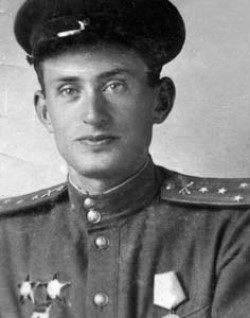Sholom Gelfond was born in 1920 in the small shtetl of Slaveni, south of Vitebsk, Belorussia. He was one of nine children. His father Khaim-Mendel Gelfond was a local rabbi. Sholom recollected that the shtetl had a large synagogue and a church, both of which were subsequently closed by the Communists. When the Nazis later occupied the shtetl, they burned down the synagogue.
There were two kolkhozes (cooperative farms) in Slaveni in the 1930s. Originally one of them was Jewish (it was called "The Jewish Toiler") but later it became ethnically mixed. Gelfond began as a worker on one of kolkhozes, but in 1938 he enrolled at the Vitebsk medical institute. At the end of 1939, Gelfond was summoned to the city committee of Komsomol (Young Communist League), where it was "recommended" that he volunteer to fight in the Soviet-Finnish war. In addition to the fact that Gelfond was known to be a good skier, there was another reason (besides the obvious political one) why he could not reject this "recommendation." According to Gelfond, when he was about to leave home to join the army, and his father was saying goodbye to him, the rabbi said "You will not die." Gelfond noted that his father's faith contributed to preserving his son's life throughout all the fighting in which he participated.
After his initial service in the Winter War with Finland, Gelfond was sent to a Leningrad artillery school. In the summer of 1941, Gelfond was back on the front line against the Finnish army, which was then advancing. However, he was in service for only two days, when he was rescued from the waters of the Gulf of Finland by a Soviet gunboat and transferred to a military hospital. After that he resumed studying at artillery school. He returned to the front in 1942 as an officer of a Katyusha rocket-launching platoon.
Gelfond fought on different fronts, from the border with Norway to the Black Sea. With the rank of major and as commander of a Katyusha battalion, he participated in the liberation of the Crimea in May 1944. In the summer of 1945, Gelfond was sent to the Far East to fight against Japan. He fought in Mongolia and in northern China. It was at this time that he met his future wife, a military nurse.
Gelfond was awarded an Order of the Red Banner, two orders of the Red Star, and with other military awards.
Gelfond's parents and two sisters, who had not left their shtetl before the war, were murdered in March 1942 by the Germans and local helpers. One of Gelfond's brothers was killed in combat .
Only after the war did Gelfond learn about the fate of his parents and sisters who had remained in Slaveni. He was outraged by the fact that the local authorities did not erect a memorial stele at the site of the mass murder of the local Jews. At his request, his friend the war veteran Makei Buryi, a Belorussian by nationality, wrote a letter to the First Secretary of the Belorussian Communist Party requesting that such a monument be erected in Slaveni. The letter remained unanswered.
After the war, Gelfond settled in Kazan, Russia, where three of his siblings had settled before the war. He began working at a large bakery as a repairman, going on to become chief engineer and, eventually, manager of the bakery. Subsequently Gelfond emigrated, moving to Germany with his children and grandchildren.







